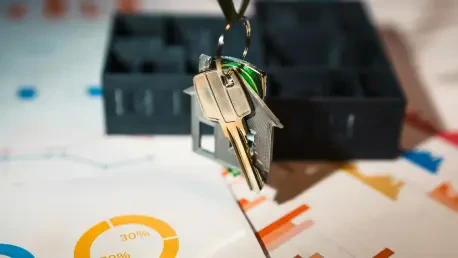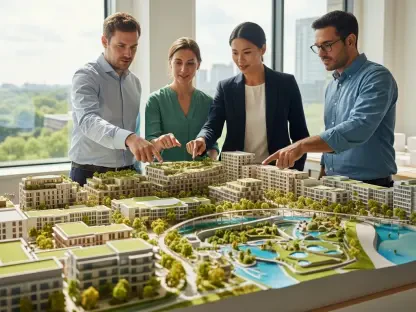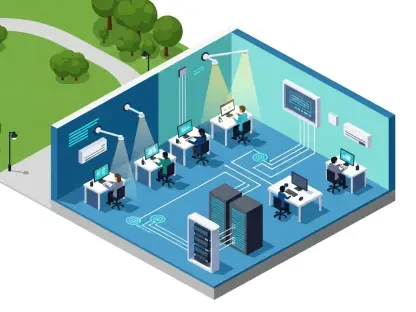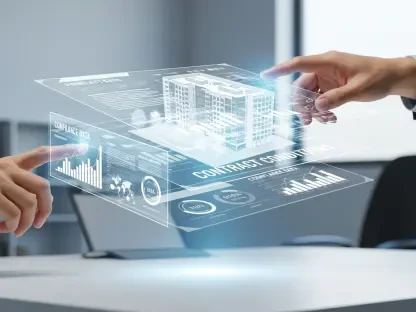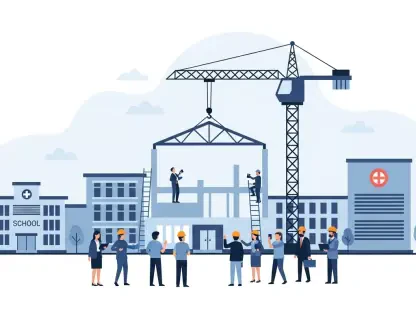In today’s rapidly evolving property management sector, the integration of technology is fundamentally transforming traditional practices. AI-driven access systems have emerged as crucial tools for meeting the modern expectations of renters and significantly enhancing operational efficiency. As these technological advancements take center stage, they render obsolete the conventional dependence on physical keys and static codes. This transformation is in response to an industry-wide recognition that innovation is necessary to meet the demands of contemporary residential communities. The landscape of property management is experiencing a digitization revolution, marking a pivotal shift towards smarter and more secure solutions.
Integrating Smart Technology in Property Management
Streamlining Operations with Unified Platforms
In the era of technological transformation, the property management industry is experiencing a shift toward more advanced and integrated systems. The recent developments in AI have consolidated key functionalities into single platforms, including smart locks, entry panels, self-guided tours, and guest access. These unified systems automate daily operations, granting property managers improved visibility into every aspect of property access. Enhanced workflows allow for seamless coordination of resident move-ins, service calls, and visitor management. The introduction of these platforms helps reduce the inefficiencies linked with outdated methods, such as misplaced keys and manual scheduling. By improving the overall management process, these systems offer property managers the tools necessary for more effective handling of multiple tasks.
Streamlining operations with unified platforms offers a comprehensive view of property access, enabling real-time adjustments and monitoring. This capability is essential for properties aiming to maintain high standards of security while also managing a large number of residents and visitors. The ability to monitor and control access remotely allows property managers to act swiftly if an issue arises, ensuring the security and satisfaction of tenants. As more property managers adopt these smart systems, the industry is moving toward a future where manual operations become a thing of the past. The seamless integration offered by these advances leads to the efficient handling of even the most complex tasks, making these platforms indispensable in modern property management.
Self-Guided Tours: Boosting Leasing Opportunities
Self-guided tours have emerged as a transformative solution for property managers, addressing several issues plaguing traditional leasing methods. The advent of these tours enables prospective tenants to schedule property viewings independently, aligning with their personal schedules rather than fixed office hours. With the ability to tour properties at their convenience, potential renters are more likely to engage with listings, leading to an increase in leasing opportunities. For property managers, this translates into fewer missed showings and a reduction in the amount of time spent on follow-up tasks, thereby streamlining the leasing process. As a result, property managers can concentrate on other aspects of their operations, knowing that their avenues for engagement with potential tenants are optimized.
The flexibility offered by self-guided tours also aligns with the dynamic lifestyles of many individuals today, especially those with demanding careers. By removing the barriers associated with traditional showings, properties can cater to a broader range of potential renters. This adaptability not only increases the likelihood of successful leases but also enhances the tenant experience from the outset. Moreover, this feature can be integrated seamlessly into existing management platforms, providing a streamlined and efficient user experience for both property managers and prospective tenants. The shift toward self-guided tours is thus setting a new standard in leasing practices, allowing property managers to efficiently navigate the competitive real estate market.
Enhancing Vendor Access and Security
Improving Accountability and Reducing Inefficiencies
For property managers overseeing multiple units, managing vendor access and ensuring the timely completion of work can be daunting. Traditional key-based systems come with their own set of challenges, including lost keys and limited accountability regarding work completion. AI-powered systems address these issues by providing traceable access credentials to vendors. This allows for real-time monitoring of entries and exits, ensuring all activities are logged systematically. With the records generated through smart access control, property managers can verify work completion, reducing inefficiencies associated with misplaced keys and enhancing vendor accountability. This mechanism not only increases security but also reduces the costs associated with rekeying locks when keys are lost or compromised.
Smart access systems significantly bolster security by enabling property managers to control and revoke access credentials as needed, reducing potential security risks. This level of control prevents unauthorized access and ensures that only the appropriate personnel can enter specific areas at designated times. Furthermore, having a comprehensive log of vendor activity enables property managers to perform audits and reviews, which can be crucial for maintaining high standards of property upkeep and safety. By leveraging AI in managing vendor access, the property management sector can enhance security and efficiency, providing peace of mind to both managers and residents alike. Embracing this technology ensures a seamless operation and signifies a commitment to contemporary security standards.
Strengthening Security in Common Areas
In multi-family properties, common areas can pose unique security challenges, often stemming from unauthorized usage and overcrowding. To address these issues, electronic access control systems have been developed, offering secure entry with unique credentials tied to individual leases. This approach not only strengthens security but also protects the privacy of residents using shared spaces. Having the ability to generate a detailed audit trail, property managers can efficiently monitor the utilization of common areas and identify any unauthorized access. This enhances the resident experience by preserving the exclusivity and intended privacy of these spaces, in turn increasing tenant satisfaction and retention.
Through the adoption of electronic access systems, property managers are equipped to swiftly revoke access when necessary, ensuring that only authorized individuals occupy shared spaces. Such control helps to minimize the risk of over-occupancy and related disturbances, thereby maintaining the quality of residential life within a property. The enhanced security measures provided by unique credentials also assure residents that management is actively investing in their safety and privacy. By integrating these systems, property management aligns itself with contemporary safety standards and expectations, moving toward creating a secure and harmonious living environment for all residents. The result is a cohesive community where security is seamlessly managed.
Embracing Digital Transformation
Importance of AI-Based Platforms
In the realm of property management, AI-based platforms are gaining traction for their ability to harness data from various access systems. These platforms are instrumental in generating actionable insights that help automate decision-making processes, making them vital for modern property management. By utilizing data from sources such as locks and sensors, property managers can gain significant insights into operations, helping in better resource allocation and proactive management. This smart utilization of data ensures that property managers are equipped to respond to the evolving demands of tenants while maintaining high standards of efficiency and security. Such platforms not only cater to immediate requirements but also offer pathways for continuous improvement.
AI-driven platforms also contribute to a broader strategic alignment with the sustainability goals of many property managers today. By automating many of the day-to-day operations, these platforms reduce the need for manual intervention, thus optimizing resource use and minimizing waste. Furthermore, the ability to predict maintenance needs and usage patterns through data analysis facilitates proactive intervention, resultantly prolonging the life of property assets and reducing unnecessary expenditure. The implementation of these AI-based systems marks a shift towards an intelligent property management approach, driven by data and designed to accommodate future growth and challenges.
Rently: Setting the Benchmark
In the fast-paced world of property management, technology is reshaping the landscape and bridging the gap between traditional methods and modern expectations. Artificial intelligence (AI)-powered access systems are now at the forefront, providing a significant boost in both efficiency and security for property owners and tenants. These systems are becoming essential in meeting the evolving demands of renters, who now expect seamless, high-tech solutions for everyday needs. As a result, traditional methods that relied heavily on physical keys and fixed codes are becoming outdated. The property management industry acknowledges the pressing need for innovation, as modern residential communities call for more advanced, flexible systems. This digital revolution is not just a fleeting trend but a fundamental shift towards enhancing safety and convenience. By integrating smart technology, property management is transitioning into an era marked by intelligent solutions that cater to the lifestyle of today’s residents, setting a new standard for future developments.
